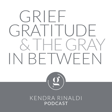
Embracing Life’s Duality: Love & Grief with Emily P. Bingham
Emily P. Bingham is a certified grief educator, grief coach, widow, and founder of moveTHRU. After the loss of her husband in 2019 to Uveal Melanoma, she started moveTHRU to create new meaning out of her tragedy by helping others heal. Emily has worked with hundreds of clients in both private and coaching groups. Additionally, she has reached millions of followers through her social media content. Her goal is to help anyone who has experienced a loss embrace grief through movement and mindset. She holds a bachelor’s degree from the University of Denver and a master’s degree from Carnegie Mellon University. She lives with her newly blended family of six in Denver, Colorado.
Emily’s book, Love & Grief: Find Healing, Meaning, and Purpose in Life After Loss offers tools for embracing grief, managing it, and identifying coping strategies inside a practical, reassuring guide.
There is no right or wrong way to ride grief, but having gone through the process of grief herself after losing her husband at a young age, Emily’s writing provides an extra layer of comfort, inspiration, and solidarity. As a spiritual life coach and widow, Emily has amassed a social media following of over 35 thousand people, offering coaching, tips, and testimonials about her own grief journey.
https://www.movethrugrief.com/
https://www.instagram.com/emilypbingham/
More information abotu coaching with Kendra Rinaldi: https://www.kendrarinaldi.com/
To be a guest on the podcast:
https://www.griefgratitudeandthegrayinbetween.com/


